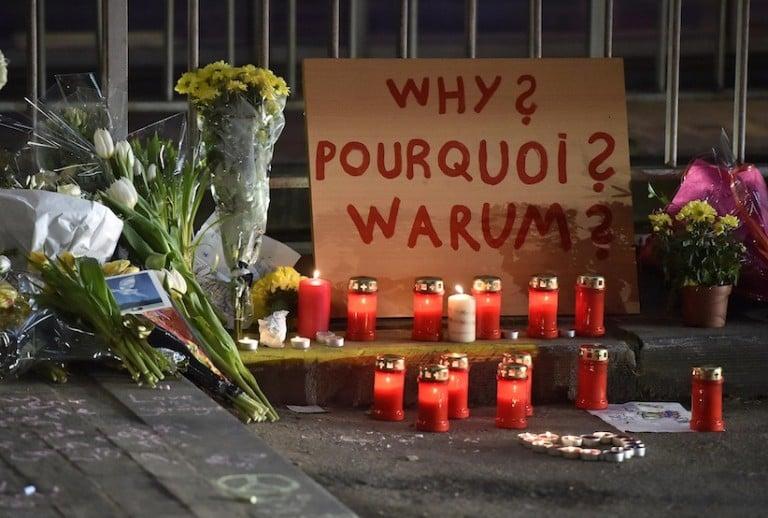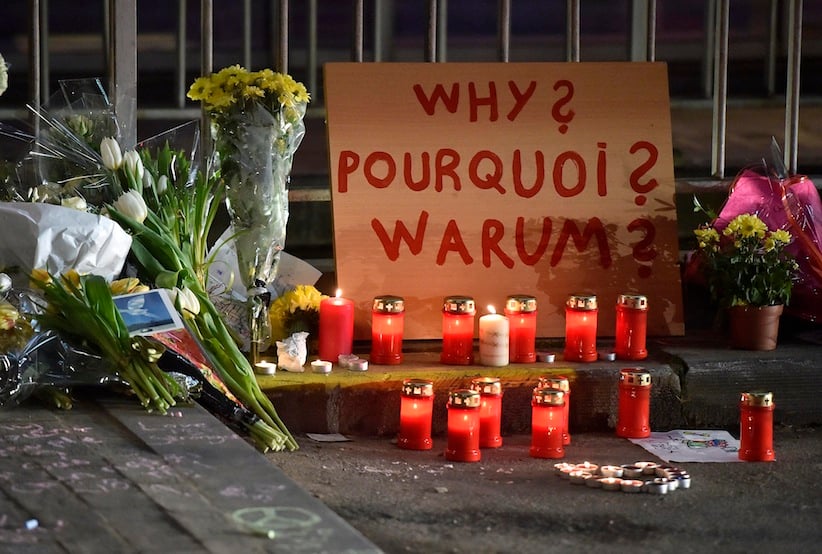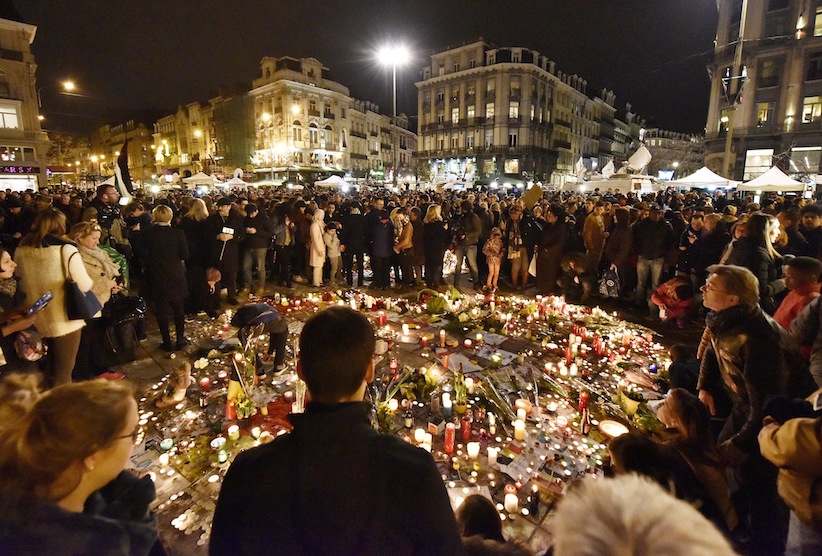After Brussels attacks, Europe’s tragic new normal settles in
On the streets of Brussels, there is anger and fear—about what has happened and what is still to come. Leah McLaren reports.

A sign reads “Why?” in English, French and Flemish behind candles and flowers near the Maelbeek metro station, in Brussels on Wednesday evening, March 23, 2016. Bombs exploded Tuesday at Brussels airport and one of the city’s metro stations, killing and wounding scores of people, as a European capital was again locked down amid heightened security threats. (AP Photo/Martin Meissner)
Share

Shocking, but not unexpected.
This is how the many residents of Brussels described Tuesday morning’s terrorist attacks in which a cell of Muslim extremists liked to Islamic State killed at least 31 people and injured scores of others. The bombings occurred in two separate locations—the city’s international Zaventem airport and Maelbeek Metro station in the city centre—and were timed closely together, during morning rush hour. At the time the city was already on alert in the wake of the arrest of a key jihadist. Authorities had warned of more planned attacks set to be carried out in the city—and they were tragically correct.
“It’s just impossible to understand,” said Sara Russo, a tearful 20-year-old university student who had gathered with friends to pay vigil in a Brussels square as part of the city’s three days of mourning. Russo is originally from Paris, and was there during the November attacks. “It’s pure nihilism, that’s all. And now I don’t feel safe at home or in my adopted city. I don’t feel safe anywhere in Europe.”
Two brothers, Khalid and Brahim el-Bakraoui, both Belgian nationals, have been identified as suicide bombers in the attacks. Belgian authorities have said Brahim detonated his bomb at the airport, killing 11, while his brother Khalid struck at Maelbeek resulting in a death toll of 20. A third attacker was caught on CCTV camera at the airport and has been identified by authorities as Najim Laachraoui. He is believed to be an expert bomb-maker also involved in the Paris attacks and acted as an accomplice to the recently apprehended terror suspect Salah Abdeslam. Abdeslam, who has been on the run since the Paris attacks, was arrested in a police raid here in Brussels just last week.
As the sombre, buttoned-down home of the EU central government, Brussels is a hard-working business capital not known for public displays of emotion. But by noon today, a crowd of several hundred had gathered in the city’s Place de la Bourse near the city’s historic Grand Place to observe a minute of silence and light candles for the dead. Chalked on the walls and pavement were pleas for peace and love in French, Dutch and English. Among the citizens, there was a general sense of bewilderment, summed up by a single desperate question scrawled on the wall: “Pourquoi?”
Related: Brussels attacked: Closing minds first, borders second
On the other side of the city, in the predominantly Muslim Molenbeek district, life goes on as normal. The streets are buzzing with people out shopping and sitting in cafés; most retailers are open for business, and while the Metro is closed, trams and taxis continue to run.
Standing outside the boarded-up house where Abdeslam was arrested last week, I meet Samir Benelcaid, a 45-year-old local radio journalist who was born in Brussels and grew up in this neighbourhood after his parents moved here from Morocco. Unlike the students in Place de la Bourse, Benelcaid is full of explanations for recent events. “The police and intelligence service, they know many things. But they don’t do anything because they are always trying to close in on the larger terrorist network,” he says, echoing a widespread dissatisfaction with the Belgian authorities’ handling of the terror threat.
Walking through the winding cobbled streets of the Molenbeek we pass groups of young men smoking and carousing in doorways in casual athletic attire. “Belgium has 50 per cent youth unemployment, and these terrorists offer kids a future,” Benelcaid explains. “They say to them, ‘You can do something, you can be a part of something. You mother might disapprove now but when you become a martyr she’ll be proud.’ You can see how it’s very alluring.”
Having said that, Benelcaid is quick to point out that he doesn’t see radicalizing forces as a mainstream force in the Muslim community who make up approximately 25 per cent of the population here in Brussels. “It’s not in the mosques or on the streets,” he says. “It’s the houses. It’s hidden away.”

Like many Muslims here, Benelcaid is worried about the rise of Islamaphobia in Belgium and wider Europe and the deepening of what he calls “the gap” between the community he grew up in and his country as a whole. “I will not apologize for these acts of terrorism as a Muslim because I don’t see it as a collective responsibility. These are the acts of madmen, not the nearly 700,000 Muslims living in this country.”
Back in the city centre, the street surrounding the entrance to the Maelbeek Metro station is still cordoned off and swarming with police officers carrying assault rifles. In the Thon Hotel, just outside the station entrance, the atmosphere is eerily quiet. The staff move about their duties soberly. Just yesterday morning the hotel lobby became a makeshift triage unit when wounded members of the public began taking refuge here—up to 40 or 50 of them in the end, mostly suffering from burns and smoke inhalation.
The hotel manager, Hans Van der biesen, describes how—shortly after 9 a.m.—he heard a loud explosion from the underground followed by clouds of billowing smoke. His staff, some of whom have basic first aid training, helped escort people out of the subway to safety and tended to their wounds with the limited in-house first aid supplies. “Eventually the emergency services arrived and took over, they started arranging the victims in order of seriousness of their wounds,” he says, motioning to a small lounge where two businessmen now sit. One of the sofa cushions is missing. A staff member later tells me it was stained with blood and needed to be cleaned. “It is not a scene I ever hope to experience again,” he says.
With any luck he won’t have to. But someone, somewhere in Europe will. With London, Paris and Brussels now on high alert for more terror attacks, it seems a matter of when, not if. Shocking but not unexpected—this, it seems, is the new normal for Europe.